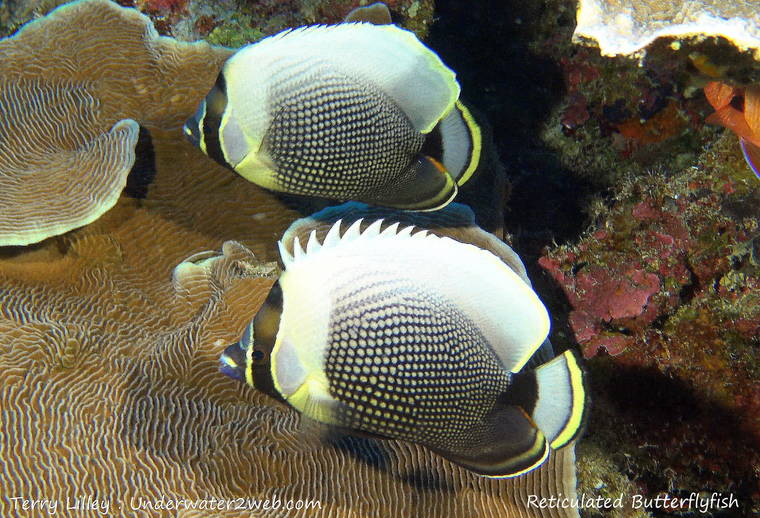Hawai‘i is famous for its clouds of butterfly fish snorkelers and divers can see here on our coral reefs. We have dozens of different species in Hawai‘i, and they all are quite colorful and stand out against dull lava reef. Most of these butterfly fish travel in pairs, but sometimes come together in large schools. Their bodies are designed to be super-thin and oval-shaped so they can dart in between the corals and rocks to avoid being eaten by predators.
Hawai‘i is famous for its clouds of butterfly fish snorkelers and divers can see here on our coral reefs. We have dozens of different species in Hawai‘i, and they all are quite colorful and stand out against dull lava reef. Most of these butterfly fish travel in pairs, but sometimes come together in large schools. Their bodies are designed to be super-thin and oval-shaped so they can dart in between the corals and rocks to avoid being eaten by predators.
In old Hawai‘i these beautiful fish had several names that all have meanings. The wonderful thing about the Hawaiian language is the animals and plants are named for the way they look, their behavior, or their importance in the community. “Kikakapu” means “strongly forbidden.” Back over 100 years ago it was “kapu,” or illegal, to take a butterfly fish off of the coral reef because these fish eat sick and dying coral polyps (tiny soft bodied coral animals), which made room for new healthy coral to grow. The Hawaiians understood that kikakapu was needed out on the reef to keep it healthy. Other butterfy fish are named “lauwiliwili,” which means it “looks like the leaf of the wiliwili tree,” or “lauhau,” which means “looks like the leaf of the hau tree.” The reticulated butterfly fish is very rare here in Hawai‘i, and after doing over 2,000 scuba dives on all the main Hawaiian Islands I have only seen one pair of these beautiful, silver, black and yellow fish, and that was along the Kona coast of Hawai‘i Island. I finally got a good video clip of them, and was so excited, as I have looked for this fish for over 10 years for my Hawai‘i fish educational video series.
Then last year I went on a dive trip to Palau in Micronesia, and the reticulated butterfly fish was one of the most common fish on the reef. I saw hundreds of them.
I shot so many good pictures of them that I started to ignore them altogether. It is quite amazing to see what fish species end up here in Hawai‘i because we are isolated by over 2,000 miles of ocean from most other coral reefs, so some of the butterfly fish made it here in large numbers and others just have not thrived well in Hawaiian waters. I am often asked the question “why are these fish called ‘butterfly fish?’” Well, they obviously look like a colorful butterfly, but where did the name “butterfly” come from? It is butter flying by? I did some research on the name “butterfly,” and it turns out that hundreds of years ago in India the flying insects were called “flutterbys.” Now that was a good, descriptive name. As the story goes, a British explorer went to India and did not understand the language well, and got the name mixed up, and called it a “butterfly,” then went back to England where the name stuck. Back then you just could not send an email and do a “fact check” like you can today, as it took four months just to get to India from England. So maybe we should rename kikakapu “the reticulated flutterby fish.” You can see all of the kikakapu species in action on the educational web page underwater2web.com in the video “The World’s Guide to Hawaiian Reef Fish.” There is also a Hawaiian marine-life identification link there, so all can see what creatures they were looking at out on the reef.
•••
Terry Lilley, a marine biologist, lives in Hanalei. His websites include underwater-2web.com and www.gofundme.com/5urrm4zw.

Subscribe today for unlimited access.
Already a subscriber?
Login
Not ready to subscribe?
Register for limited access.
If you have a print subscription but require digital access,
activate your account.





